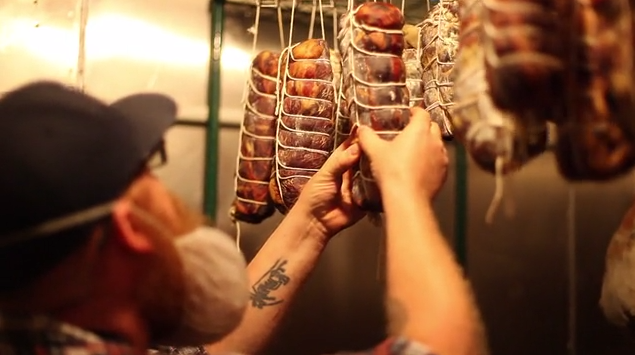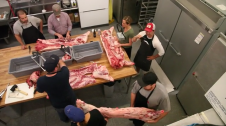






 The Underground Food Collective seeks funds to develop an open-source food safety plan for its salami (Courtesy: UFC)
The Underground Food Collective seeks funds to develop an open-source food safety plan for its salami (Courtesy: UFC)
From day one, the Underground Food Collective (UFC) has supported the Madison community by sourcing produce from local farms, embracing sustainable food practices and employing a purely seasonal cooking strategy. On Sept. 12 UFC asked the community for its support for a 30-day Kickstarter, which will help the collective publish a public food safety plan for artisanal salami producers.
Founded in 2005 by a group of collective chefs, brothers Jonny and Ben Hunter are the only founding members still involved with UFC. The collective has blossomed into four growing businesses: Underground Catering, Underground Meats, Forequarter restaurant and Underground Butcher. It may surprise some that four businesses can function without a designated owner or head chef, but UFC seems to thrive with its collective structure. A group of six chefs, family, friends and other partners around the community contribute to the UFC team.
Some of the UFC chefs have professional training, but the majority of training occurs in-house.
“You can learn a lot more working in the job,” said Jonny Hunter. He added that the collective does a great deal of experimentation, especially with its charcuterie, which is meat preserved by other methods than cooking.
Currently UFC may only distribute with Wisconsin because of the strict federal regulations on meat processors. However, the collective has plans to expand Underground Meats’ radius by shipping to cities like Minneapolis, Chicago, Ann Arbor and New York, according to Hunter. In order to take the next step, UFC must acquire a new, validated Hazard Analysis and Critical Control Points, (HACCP).
A HACCP is a written documentation of the food production process that describes the safety procedure for eliminating contaminates. HACCPs are not foreign to UFC, but “as we get bigger the robustness of our HACCP plans have to be stronger,” according to Hunter.
“There’s only really like four or five people doing what we do with their sausage, if you’re doing a less unique process you can find a HACCP for that,” said Hunter.
In the video advertising UFC’s Kickstarter, Hunter explains the unique salami process; instead of cooking the meat, the collective lowers the pH and dries the meat to eliminate bacteria.
 Developing and testing a food safety plan can cost $40,000. UFC will make its process open to the public (Courtesy: UFC)The process may seem straightforward enough, but a new HACCP may cost up to $40,000 to get validated.
Developing and testing a food safety plan can cost $40,000. UFC will make its process open to the public (Courtesy: UFC)The process may seem straightforward enough, but a new HACCP may cost up to $40,000 to get validated.
“We have to hire a third party to go through and test our assumptions, make a salami,” said Hunter. “While it’s a huge barrier, it’s also something that is really important for food safety in general.”
Once UFC validates a new HACCP for its dry-cured salami, the collective plans to publish the process online through Creative Commons, an organization that authorizes public sharing of copyrighted material. This will allow other artisan salami or charcuterie producers to use the HACCP at little expense.
“We shouldn’t be trying to hide this information,” said Hunter.
However, most artisan producers do try to conceal their process. Since the dry-cured salami method is so labor intensive and cannot be automated, the only artisan salami producers are small companies; and once a small company spends $40,000 validating a HACCP, the information becomes too valuable and costly to share, said Hunter.
In other business ventures, Madison’s Alcohol License Review Committee recently approved Underground Catering for a full liquor license in the new Central Library off of the Capitol Square. UFC has been catering at Central Library since it opened in September.
It seems that no obstacle will deter the collective from meeting its goals.
Looking to the future, UFC plans to initiate an “information sharing hub” to educate people about its discoveries and experiences, and to connect with other meat producers. The hub will include videos, tutorials, and helpful links about the salami-making process and how to work with HACCPs, according to Hunter.
The Kickstarter extends until Oct. 12, and 40 thousand dollars must be pledged in order for UFC to go forth with the HACCP validation.
To help UFC become USDA-certified or to learn more about the Kickstarter project visit the Underground Meats’ Kickstarter page.
|
|
|
Welcome to the Madison Commons, a website designed to provide news and information about all of Madison's neighborhoods and a crossroads for the discussion of community issues. The name comes from the idea of a village commons, a place for news, talk, debate, and some entertainment, too, that's open to everyone.
All rights reserved. Read more about the Madison Commons and its partners.

